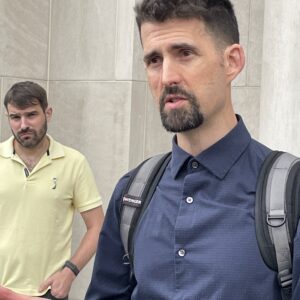Ian Freeman walked into the courtroom Monday to a standing ovation from his libertarian supporters and walked out in handcuffs, facing eight years in federal prison.
What led the former Free State Project leader and self-described peace activist to a prison sentence for the better part of a decade? According to Judge Joseph LaPlante, it was Freeman’s faith in his own libertarian/voluntarist ideas.
“It’s not that the ideology caused the crime, but the ideology caused him to lose perspective,” LaPlante said.
After taking millions of dollars from elderly and desperate people being victimized by online scammers, Ian Freeman told United States District Court Judge Joseph LaPlante that he was a victim in the Bitcoin conspiracy case.
“I was also a victim of the scammers,” Freeman told LaPlante.
According to Freeman’s telling, he was simply operating the Shire Free Church dedicated to spreading the Good News about Bitcoin when the victims of romance scams and other confidence tricks started buying the cybercurrency from his exchange. Those victims were trained by their scammers to lie to Freeman to get around his security system, making him an unwitting accomplice to the scams.
“I’m sorry those people were taken advantage of, and I couldn’t stop them all,” Freeman said.
But Assistant United States Attorney Georgiana MacDonald told LaPlante that Freeman was a manipulative liar who knew exactly what he was doing when he set up his BitCoin exchange.
“He is an expert conman who has a spin for everything and who executed a very clever scheme,” MacDonald said.
The state alleged that Freeman set up his Bitcoin exchange using various entities like the Shire Free Church to conceal what he was doing — laundering money for online criminals. He advertised his commitment to “privacy” and even let the world know he would exchange Bitcoin for Nigerian currency. At the same time, Freeman charged exorbitant fees between 10 and 20 percent, enriching himself along the way.
“He knew what he was doing,” MacDonald said.
Most mainstream cryptocurrency exchanges charge less than one percent for transactions. MacDonald said Freeman bought his Bitcoin through legitimate exchanges with far lower fees. Freeman was open to attracting criminals to his exchange, she said. The scammers would have victims buy Bitcoin directly from Freeman and deposit it in their digital wallets. The scammers would then cash out the Bitcoin, essentially without a trace.
“Why were scam victims from all over the country buying from Ian Freeman?” MacDonald said.
A jury convicted Freeman on eight felony counts, including conspiracy to launder money obtained through wire fraud, connected to his Bitcoin exchange. Freeman disputed that he knowingly participated in the scams but acknowledged that the jury voted to convict. That meant they either did not like him or did not believe him, Freeman said.
“I have to accept that,” Freeman said.
His wife, Bonnie Freeman, insisted her husband would never hurt anyone. She said that his business was part of his Shire Free Church, which sought to change the world for the better through Bitcoin.
“Bitcoin is sacred to us,” Bonnie Freeman said.
Freeman’s attorneys, Mark Sisti and Richard Guerriero, plan to appeal the convictions.
Freeman started the day facing up to 21 years in prison. But LaPlante said the sentencing range for the case was out of line with the conduct, calling that amount of time unreasonable in this case.
While Freeman was seeking 38 months, or a little more than three years, LaPlante said the 96-month sentence he imposed was appropriate. LaPlante denied Guerrireo and Sisti’s motion to delay the sentence pending the appeal, saying they are unlikely to get the sentence overturned or reduced on appeal.
“I can’t see that happening,” LaPlante said.
Freeman was arrested in 2021 when federal agents raided his home and businesses associated with his Bitcoin exchange. Five other people were arrested along with Freeman in the case, earning the nickname the “Crypto 6” in libertarian circles. All of the other members of the Crypto 6 either had charges dropped or took plea deals, resulting in minimal prison sentences.
Aria DiMezzo, 35, was sentenced to 18 months in prison after she took a plea deal earlier this year. Rich Paul, 56, Renee Spinella, 28, and Andrew Spinella, 37, all pleaded guilty as well and have served their sentences. Paul was in the group of supporters who filled the courtroom Monday. U.S. Marshals admonished him due to his emotional outbursts in court.
The sixth suspect, Colleen Fordham, 65, had the charges against her dropped.
Freeman, DiMezzo, and Nobody are all part of the Free Keene collective, an offshoot of the Free State Project. The group made a show of kicking Freeman out of the movement in 2014 after he repeatedly advocated for lowering the age of consent.
The Free State Project is a libertarian initiative started by Jason Sorens to overtake the state’s government. Freeman is also an advocate of seceding from the United States.




